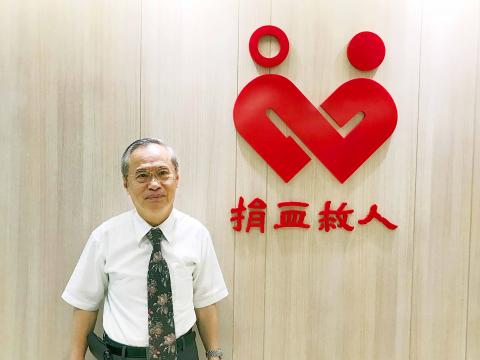The Taiwan Blood Services Foundation is to start before the end of the year a trial run of blood donations from people aged 65 to 70 with an eye to petitioning the government to ease regulations on donor eligibility.
Given an aging population, Taiwan is faced with the dilemma of an ever-increasing demand for blood for transfusions, while its number of eligible young donors declines, the foundation said.
Raising the age limit for donors is an option to boost the nation’s blood supply, foundation chairman Hou Sheng-mao (侯勝茂) said in an article published in the Taiwan Medical Journal.

Photo: CNA
The US, Canada and other nations have been pushing the same measure, as elderly people have the lowest risk for blood-transmitted diseases, he wrote.
As of last year, Taiwan had a blood donation rate of 7.55 percent, which is higher than the average 4 to 5 percent in other countries, the foundation said.
Annual donations reach about 2.5 million bags of 250ml each, with the figure rising steadily, it said.
However, demand is also surging: From 2014 to last year, it rose 4 percent from 2.22 million bags of blood to 2.31 million bags, foundation statistics showed.
Donors were mainly older people, with those aged 41 to 65 contributing 799,000 bags, while donations by younger people, aged 17 to 30, decreased from 629,000 bags to 535,000 bags, the data showed.
Lagging supply leads to a rapid depletion of stored plasma during natural disasters, foundation consultant Lin Tung-tsan (林東燦) said.
Fit and healthy older people have been calling on the government to ease donor restrictions, Lin said.
According to the Food and Drug Administration’s (FDA) Standards for the Health of Blood Donors (捐血者健康標準), people over 65 years old who wish to donate blood must obtain a doctor’s permission and present proof of health.
The trial’s aim is to raise the age cap for donors to 70, with an accompanying clause that they must have donated blood within the past two years without experiencing any discomfort, the foundation said.
It marks the first time in 18 years that the country is discussing whether to relax regulations on donor age, Lin said.
The trial run would impose a maximum donation of 250ml per session, but would allow males to donate up to four times a year — up from three — while platelet donation would remain the same at one unit per session, not fewer than four weeks between sessions and no more than 12 times a year, Lin said.
After a trial run of one to two years, the foundation hopes to present the results and petition the FDA to raise the age limit for donors, it said.
FDA drug division official Huang Mei-chen (黃玫甄) said that the agency would not preclude such discussions.

The Executive Yuan yesterday announced that registration for a one-time universal NT$10,000 cash handout to help people in Taiwan survive US tariffs and inflation would start on Nov. 5, with payouts available as early as Nov. 12. Who is eligible for the handout? Registered Taiwanese nationals are eligible, including those born in Taiwan before April 30 next year with a birth certificate. Non-registered nationals with residence permits, foreign permanent residents and foreign spouses of Taiwanese citizens with residence permits also qualify for the handouts. For people who meet the eligibility requirements, but passed away between yesterday and April 30 next year, surviving family members

The German city of Hamburg on Oct. 14 named a bridge “Kaohsiung-Brucke” after the Taiwanese city of Kaohsiung. The footbridge, formerly known as F566, is to the east of the Speicherstadt, the world’s largest warehouse district, and connects the Dar-es-Salaam-Platz to the Brooktorpromenade near the Port of Hamburg on the Elbe River. Timo Fischer, a Free Democratic Party member of the Hamburg-Mitte District Assembly, in May last year proposed the name change with support from members of the Social Democratic Party and the Christian Democratic Union. Kaohsiung and Hamburg in 1999 inked a sister city agreement, but despite more than a quarter-century of

Taiwanese officials are courting podcasters and influencers aligned with US President Donald Trump as they grow more worried the US leader could undermine Taiwanese interests in talks with China, people familiar with the matter said. Trump has said Taiwan would likely be on the agenda when he is expected to meet Chinese President Xi Jinping (習近平) next week in a bid to resolve persistent trade tensions. China has asked the White House to officially declare it “opposes” Taiwanese independence, Bloomberg reported last month, a concession that would mark a major diplomatic win for Beijing. President William Lai (賴清德) and his top officials

‘ONE CHINA’: A statement that Berlin decides its own China policy did not seem to sit well with Beijing, which offered only one meeting with the German official German Minister for Foreign Affairs Johann Wadephul’s trip to China has been canceled, a spokesperson for his ministry said yesterday, amid rising tensions between the two nations, including over Taiwan. Wadephul had planned to address Chinese curbs on rare earths during his visit, but his comments about Berlin deciding on the “design” of its “one China” policy ahead of the trip appear to have rankled China. Asked about Wadephul’s comments, Chinese Ministry of Foreign Affairs spokesman Guo Jiakun (郭嘉昆) said the “one China principle” has “no room for any self-definition.” In the interview published on Thursday, Wadephul said he would urge China to